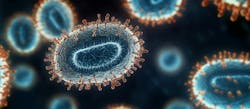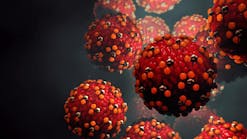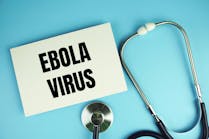Novavax, based in Gaithersburg, MD, said it is preparing to apply for emergency use authorization (EUA) from the U.S. Food and Drug Administration (FDA) for the company's COVID-19 vaccine candidate, NVX-CoV2373.
NVX-CoV2373 is a subunit vaccine made from a stabilized form of the coronavirus spike protein using the company’s recombinant protein nanoparticle technology. The purified protein antigens in the vaccine cannot replicate or cause COVID-19. The vaccine also contains a proprietary adjuvant, MatrixM. Adjuvants are additives that enhance desired immune system responses to vaccine.
NVX-CoV2373 can be stored, handled, and distributed at above-freezing temperatures (35° to 46°F.) A single vaccine dose contains 5 micrograms (mcg) of protein and 50 mcg of adjuvant. The vaccine is administered as two intramuscular injections 21 days apart. The technology used for this vaccine was developed under a long-standing contract with the Department of Defense.
In June, the National Institutes of Health (NIH) shared results from a Phase 3 clinical trial of NVX-CoV2373 that enrolled 29,960 adult volunteers in the United States and Mexico. The NIH said that the investigational vaccine demonstrated 90.4% efficacy in preventing symptomatic COVID-19 disease in the trial. The vaccine showed 100% protection against moderate and severe disease. In people at high risk of developing complications from COVID-19 (people 65 years or older and people under age 65 with certain comorbidities or with likely regular exposure to COVID-19), the vaccine showed 91.0% efficacy in preventing symptomatic COVID-19 disease.
Novavax led the clinical trial known as PREVENT-19. The Biomedical Advanced Research and Development Authority (BARDA), a component of the HHS Office of the Assistant Secretary for Preparedness and Response, and the National Institute of Allergy and Infectious Diseases (NIAID), part of the NIH, provided funding support for the trial as part of the federal COVID-19 response.
The PREVENT-19 trial began in late December 2020 and enrolled adult volunteers at 119 study sites, including those in the NIAID-supported COVID-19 Prevention Network (CoVPN). Participants were randomly assigned to receive two shots, 21 days apart, of either the investigational vaccine or a saline placebo. Randomization occurred in a 2:1 ratio with two volunteers receiving NVX-CoV2373 for each one who received placebo. Because the trial was blinded, neither investigators nor participants knew who received the candidate vaccine.
PREVENT-19 was designed to evaluate whether NVX-CoV2373 can prevent symptomatic COVID-19 disease seven or more days after the second injection relative to placebo. The results are based on 77 cases of symptomatic COVID-19 that investigators observed among trial participants from January 25 through April 30, 2021. Investigators recorded 63 cases among the approximately 10,000 participants who received placebo and 14 cases among the approximately 20,000 participants who received the investigational vaccine. Of the 63 COVID-19 cases in the placebo group, investigators classified 10 as moderate and four as severe. There were no cases of moderate or severe disease in the investigational vaccine group.
In May 2021, PREVENT-19 was expanded to evaluate the safety, efficacy and immunogenicity of NVX-CoV2373 in adolescents aged 12-17.





